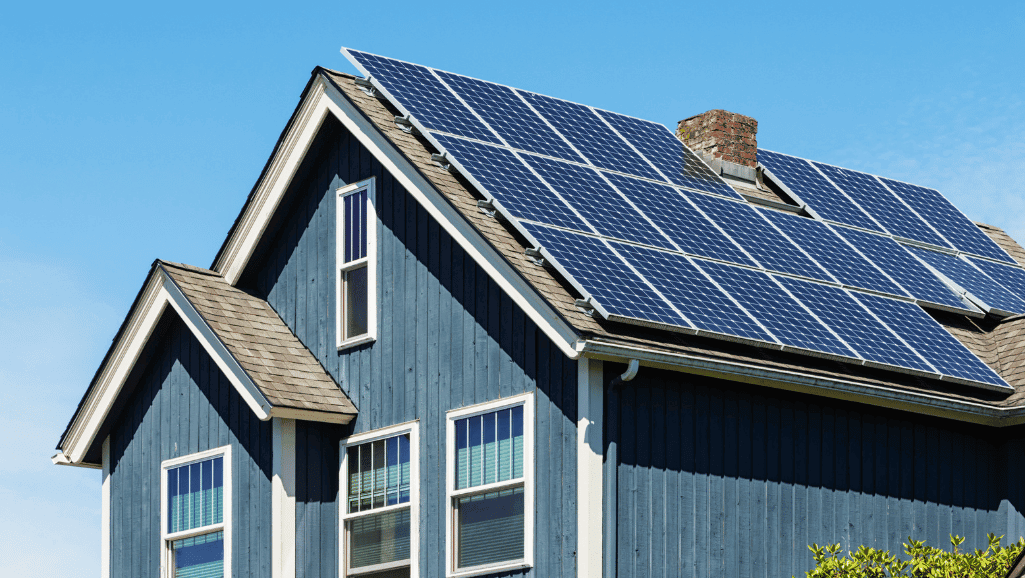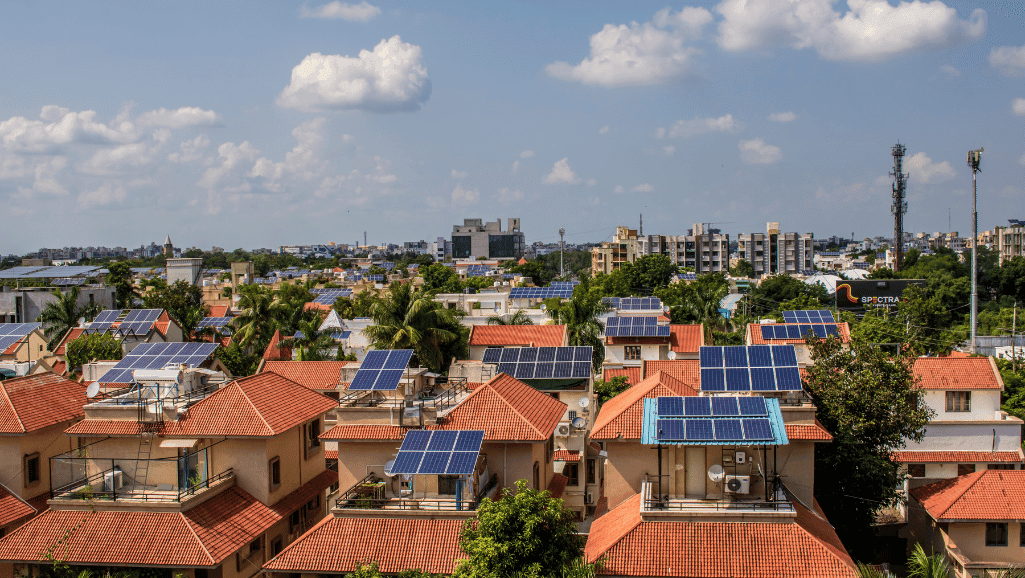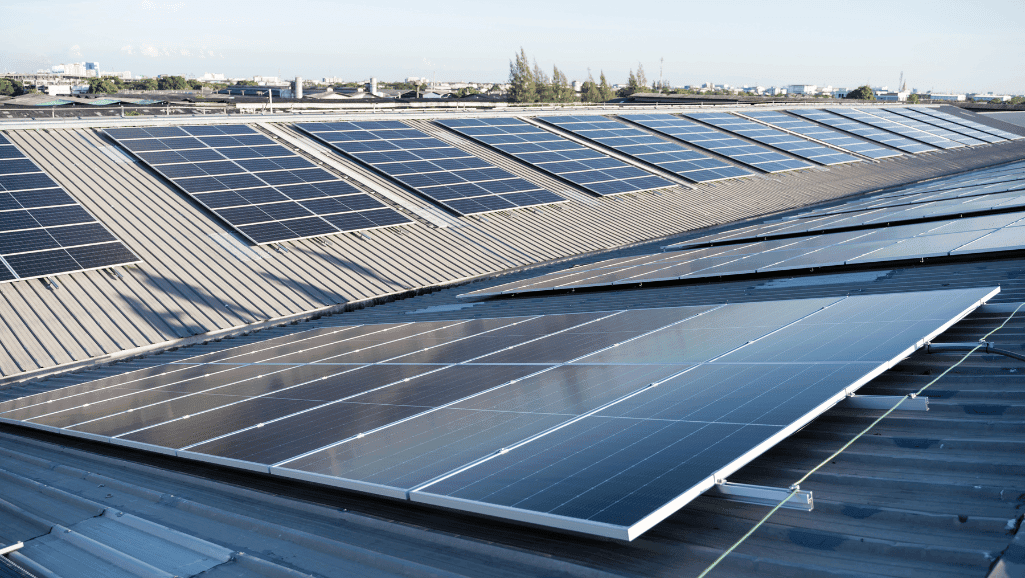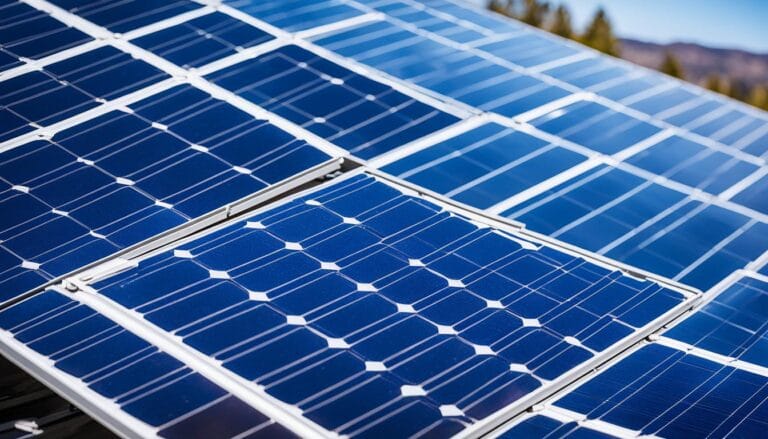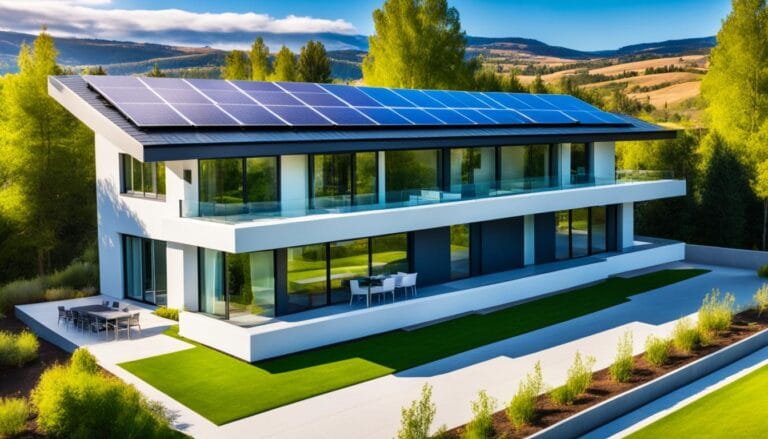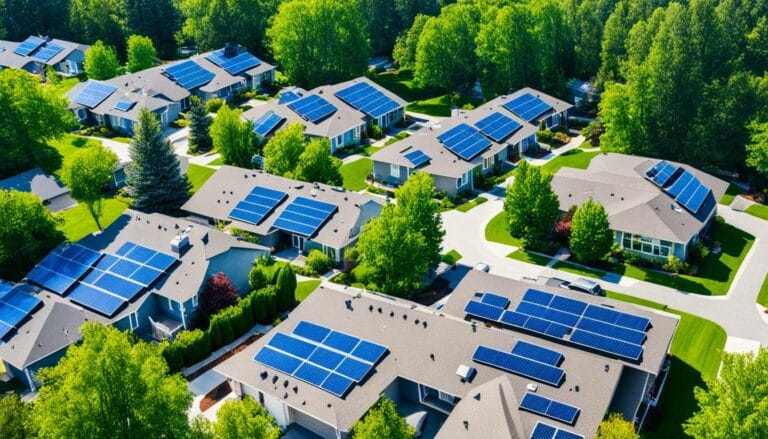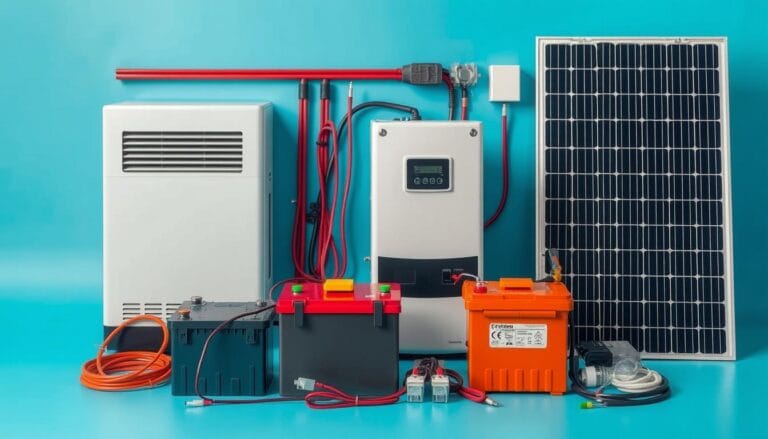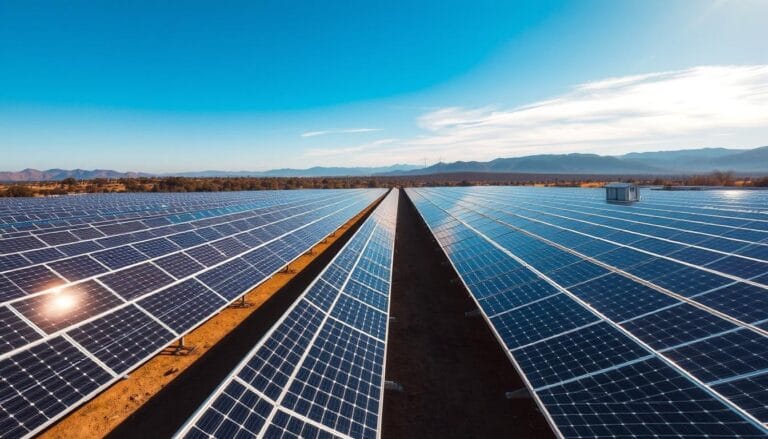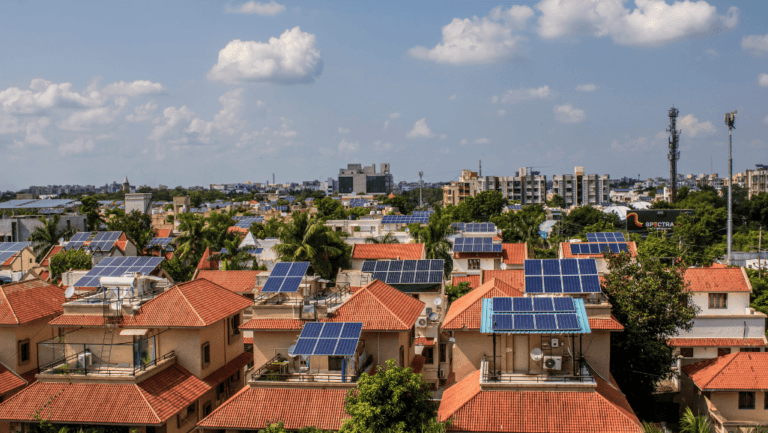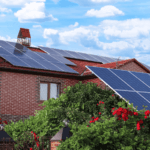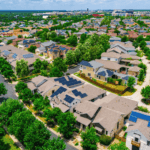Using solar power for homes is a big step towards sustainable living with solar energy. Homeowners are choosing renewable energy for houses for its many benefits. It helps the planet and saves money over time.
Home solar installation is a smart move for those wanting a greener life. It cuts down on carbon emissions and greenhouse gases. Plus, it’s a smart financial move, leading to lower energy bills.
Residential solar energy benefits are many. It gives homeowners control over their energy use with battery storage. The average home uses about 10,400 kWh of electricity a year. Solar panels offer a steady, green power source, reducing reliance on traditional energy sources.
Installing solar panels can also increase your home’s value and save you money after incentives. This makes solar power a valuable addition to any home.
Solar power is leading the way in the energy revolution. States like Texas are seeing a big increase in solar power for homes. Costs have dropped a lot in the last decade, making solar more affordable and wise.
To understand the importance of solar power for a cleaner future, check out Verde Solutions.
Key Takeaways
- Embracing solar energy leads to significant environmental benefits and reductions in carbon emissions.
- Financial incentives, including tax credits and rebates, can drastically lower the upfront costs of solar systems.
- Technological advancements have made solar power systems more affordable and efficient than ever.
- Homeowners can achieve energy independence through solar power, buffering against variable energy costs.
- Solar energy contributes to property value appreciation, presenting an advantageous investment for house owners.
- Systems accredited by the NABCEP ensure high-quality installations and reliable performance.
The synergy of Energy Star appliances with solar energy systems can ramp up economic benefits and efficiency.
The Rise of Residential Solar Energy
The growth in home solar installations shows a big shift towards renewable energy. More people are using solar panels for residential use in the U.S. This change is thanks to lower costs, better technology, and laws that support it.
Understanding the Growth in Home Solar Installations
Recently, the demand for residential solar panels has grown a lot. There’s been a steady increase in installations and new tech. In fact, there was a 34% jump in home solar panel system installations last year. This shows more homeowners want to use clean energy.
Key Factors Driving Adoption of Solar Panels for Residential
Many things are pushing people to use solar panels for residential use. Things like lower costs and caring for the environment help. Also, laws like the Inflation Reduction Act are making solar more popular.
| Year | New Installations (GW) | Total Capacity (GW) |
|---|---|---|
| 2020 | 2.9 | 58.5 |
| 2021 | 3.9 | 62.4 |
| 2022 | 6.2 | 68.6 |
| 2023 | 7.0 | 75.6 |
This table shows how growth in home solar installations keeps going up. It also shows the growing need for renewable energy in homes.
Environmental Impact and Sustainability of Solar Power
More people are using solar energy for their homes. It’s important to know how solar power affects the environment and its sustainability. Solar energy helps cut down on carbon emissions and supports using renewable energy sources.
Reducing Carbon Footprints with Home Solar Systems
Home solar systems help fight climate change. They make energy without releasing harmful gases. In just 1 to 4 years, they can make enough energy to pay back the energy used to make them.
They last more than 30 years, greatly reducing the carbon emissions from home energy use.
Conservation of Resources and Sustainable Energy Solutions
Using solar panels saves natural resources. Solar energy doesn’t need water, which helps conserve this precious resource. But, we must think about the environment when setting up solar panels.
Cleaning solar panels in dry areas might use a lot of water, hurting local ecosystems. Also, making room for big solar farms can harm plants and animals.
| Aspect | Impact | Sustainability Measures |
|---|---|---|
| Water Usage | Used in cleaning collectors, potentially affecting arid ecosystems | Development of water-efficient cleaning technologies |
| Land Use | Can disrupt native wildlife and habitats | Strategic siting of panels, use of marginal lands, monitoring of wildlife interactions |
| Resource Conservation | Solar panels significantly reduce the use of fossil fuels | Recycling of panels, enhancing longevity and efficiency of systems |
Research is making solar panels better for the environment. They’re becoming easier to recycle and less harmful when they’re old. Studies also look at how solar panels can help farms and protect nature.
Learning about these effects shows how solar energy is good for the planet. It makes a strong case for using it more in the U.S.
Financial Benefits for Homeowners Adopting Solar Energy
Homeowners gain many benefits from solar energy, like big savings and higher property values. The financial benefits of residential solar energy are clear. This is why many are switching to this green power source.
Explore detailed insights on the economic advantages of solar.
Long-Term Savings and Lower Utility Bills
Solar power cuts down monthly energy costs. A study shows that solar systems can add about $15,000 to a home’s value. Plus, the energy they make leads to big savings on utility bills over time.
Incentives and Tax Credits for Residential Solar Installations
The government sees the long-term value of solar energy. It offers a residential renewable energy tax credit. This was 30% until 2019, then 26% in 2020. It will be 22% in 2021 before ending.
The tax credit is dropping, so homeowners should act fast to get the most benefits. Solar panels are good for the planet and smart financially with the current residential renewable energy tax credit rules.
The Versatility and Uses of Solar Panels for House Applications
Solar energy has grown beyond just making electricity. Now, it offers uses of home solar panels for many needs. These solutions are designed for different places and needs. This part looks at how solar energy works in various homes and off-grid situations.
Off-Grid Solutions and Energy Independence
Many homeowners want solar energy independence. They choose off-grid solar solutions for a steady energy supply. This way, they avoid the ups and downs of regular power sources. They enjoy being free from power cuts and price hikes.
Diverse Applications: From Electricity to Heating
Solar energy is used in many ways, from heating homes to making clean water. Solar panels fit into many places, showing how far sustainable energy can go in homes.
| Feature | Impact | Cost Analysis |
|---|---|---|
| Home Value Increase | Up to 4% rise | $20 value increase per $1 saved on energy |
| System Longevity | 25-30 years of service | $18,000 average installation cost |
| Off-Grid Independence | Energy self-reliance | Cost between $7,000 to $14,000 for advanced lithium-ion systems |
| Maintenance | Low need with high reliability | $140 to $180 annual servicing |
| Emission Payback | 1-4 years to offset carbon costs | Sustainable within short term |
Solar technology offers great financial and environmental benefits. It’s perfect for any home, whether in the woods or the city. Solar panels bring many advantages, showing how important solar power is today.
Home Solar Panel System Efficiency and Maintenance
Using solar power can make your home more energy efficient. It’s important to know how to keep your solar panels working well. By taking good care of your solar panels, you can keep them running well and save money over time.
Minimizing Upkeep with Durable Solar Technology
Modern solar panels are built to last. They can handle tough weather and work well for 20 to 30 years. You’ll need to clean them now and then to keep them running at their best. Clean them in the cooler part of the day to avoid damage.
Maximizing Energy Capture with Optimal Solar Panel Placement
Putting your solar panels in the right spot is key to getting the most sun. This means they should face the sun and be free from shadows. Also, raising the panels a bit helps keep them cool, which keeps them working better and longer.
| Factor | Description | Impact on Efficiency |
|---|---|---|
| Installation Angle | Angle at which panels are installed relative to the ground | Optimized to maximize sun exposure, enhancing energy capture |
| Maintenance Frequency | Frequency of cleaning and checks for damage or obstructions | Regular maintenance can prevent up to 1% efficiency loss per year |
| Environmental Factors | Effects of weather conditions like temperature and precipitation | Proper placement and elevation mitigate negative impacts, maintaining output |
Looking after your solar panels and installing them right are key to their success. Getting experts to check on your system can help keep it running at its best for years.
Assessing the Costs: Solar Panels for Home Cost and Value Proposition
Thinking about solar panels for your home involves looking at two main costs: the initial investment and the long-term benefits. Knowing these costs and benefits helps homeowners make smart choices about solar power. This can lead to higher real estate values in the future.
Initial Investment vs. Long-Term Gains
The cost to install solar panels is high. On average, a system for a typical home costs about $25,000. Prices can range from $18,000 to $36,000, depending on where you live and the installation details. But, there are incentives like the Residential Clean Energy Credit that can cut the cost by 30% through 2032. States also offer rebates, property tax exemptions, and more credits, making solar panels more affordable upfront.
Looking at the long-term, solar energy lowers your reliance on utility power and cuts your bills. The National Renewable Energy Laboratory says saving a dollar on energy can increase a home’s value by $20. Over time, lower bills and higher property values make the solar investment pay off.
Real Estate Value Increase with Solar Installations
Solar panels improve energy efficiency and make your property more appealing, especially in eco-friendly markets. A Zillow study shows homes with solar sell for about 4% more than similar homes without them. Plus, these homes sell 20% faster, showing buyers prefer sustainable, efficient homes.
High local electricity rates and good solar conditions boost these benefits. In states like California, Colorado, and Massachusetts, solar installations lead to the biggest increases in property values. Clearly, the cost of solar panels for your home pays off over time and adds a lot to your property’s value.
| Key Factor | Impact |
|---|---|
| Initial Investment (Average Cost) | $25,000 |
| Long-term Gains (Increased Home Value) | $20 for each $1 of energy saved annually |
| Real Estate Premium | Up to 4% increase in home value |
| Sale Speed Increase | Homes with solar sell 20% faster |
| Incentives | 30% federal tax credit, plus state incentives |
Solar Energy Solutions for Homeowners
Homeowners are now looking into solar energy for a sustainable and cost-effective way to power their homes. This section covers the basics of setting up a residential solar installation. It also talks about the key role of professional solar consulting services and the choices for home solar system customization.
Customized Solar Power Systems for Diverse Home Needs
Every home has its own energy needs and challenges. That’s why customized solar solutions are key. Solar installations aren’t the same for every home. Some homes do well with rooftop panels, while others need ground-mounted systems because of shading or roof shape.
Here are some system types that fit different conditions:
- Grid-tied systems for easy utility connection.
- Grid-tied systems with battery backup for power during outages.
- Fully off-grid systems for places without reliable utility.
Things like roof direction, shade, and energy use affect system design. Home solar system customization makes sure these factors are considered for the best efficiency and happiness.
Where you put solar panels matters too. Ideal roofs face south or have east and west sides to catch the most sun. But, if your roof is always in the shade or not right for panels, you might look into community solar programs.
Professional Solar Energy Consulting Services
Starting with solar power can feel overwhelming without expert help. That’s where professional solar consulting services come in. They offer great advice on the best solar options for homes. Experts help with picking systems, understanding local rules, and getting the most from government incentives.
They also look at how much energy you can save and the investment payback. They consider the environmental benefits and help with tax credits or rebates. After installation, they guide on upkeep and check-ups to keep systems running well.
In summary, using solar power well needs a detailed plan that focuses on the homeowner. This requires expert advice and customized solutions.
Rooftop Solar Power: Revolutionizing Residential Energy
Rooftop solar power is changing the way we think about home energy. It’s becoming a key part of sustainable and affordable energy solutions. Thanks to lower solar panel costs and big incentives from the government, more people are using it.
The Technology Behind Rooftop Solar Systems
Rooftop solar uses advanced solar cells and storage systems. New solar panels absorb more sunlight and turn it into energy better. They also have better inverters that change the DC power into AC power for homes.
Devices like the EcoFlow DELTA 2 store extra energy for when the power goes out. This means homeowners can rely on their own energy and save money.
Case Studies: Success Stories of Rooftop Solar Adoption
Many people are finding success with solar power. In sunny places like Arizona, solar panels work even better. Even in places with less sun, like Vermont, homeowners can save a lot on bills by placing their panels just right.
| Year | Cost of 6 kW Solar System | Expected Cost by 2030 |
|---|---|---|
| 2010 | $40,000 | ~$10,800 |
| 2023 | $18,000 |
The cost of a 6 kW solar system has dropped a lot, and it’s expected to go down another 40% by 2030. This makes solar power more affordable and helps more people live sustainably.
Rooftop solar is getting cheaper and can work with different roofs and energy needs. It’s leading to a greener future and saving homeowners money. As solar technology gets better, it will play an even bigger role in our search for sustainable energy.
“Solar Power for Homes”: Navigating the Journey Towards Energy Independence
Switching to solar power is a big step towards using less energy and living sustainably. It’s good for the planet and can save you money. We’ll explain how to start using solar power at home and talk about the challenges and myths about it.
Steps to Transitioning from Conventional Power to Solar Energy
Starting with solar energy means looking at your home’s energy use. You need to check how much energy you use every day and see if your roof can hold solar panels. Talking to experts like Fenice Energy can make it easier and help you get the most out of your setup.
Cost is a big factor, but solar power can save you money over time. It also makes your home worth more. Many countries, like Australia and India, offer help with the cost to make solar power more affordable.
Overcoming Challenges and Myths Associated with Home Solar Adoption
Some people think solar panels are too expensive. But they pay for themselves over time. With programs like the PM Surya Ghar Muft Bijli Yojana in India, going solar is easier than before.
Some people believe solar panels need a lot of upkeep or don’t work well in cloudy weather. But today’s solar panels are tough and need little maintenance. Just clean them now and then to keep them working well.
| Country | Percentage of Electricity from Solar | Description |
|---|---|---|
| Germany | 40% | Leading in renewable energy adoption, with significant government backing. |
| California, USA | 20% | Advances in solar technologies and substantial state-level incentives. |
| Kenya | 85% (Renewable) | Majority of power from renewable sources, showcasing diverse energy reliance. |
| India | Increasing rapidly | Solar Ghar initiative and government schemes pushing toward a solar future. |
As solar technology gets better and costs go down, more people are using the sun’s power. This move helps them be more independent with their energy. By understanding the real benefits and savings of solar, more folks can make smart choices about going green.
Conclusion
The message is clear: benefits of solar power for homes are key for the future. The sun’s energy is huge, meeting our yearly needs in just one hour. This makes solar power a top choice for our planet.
Now, solar panels are more affordable and efficient. This changes the story from solar being a backup to a leading viable energy source. It’s a big win for our planet.
The solar journey is full of potential to change our energy use. It brings big savings, creates jobs, and cuts carbon emissions. Solar power benefits for the planet are clear.
Research and development keep improving solar tech. They’re tackling issues like not always working and needing a lot of space. Energy efficiency consulting helps with the tricky parts of going solar.
The story of solar power keeps getting better. It’s used in many things, from homes to boats. The right support, like rebates and policies, is coming to help it grow.
Fossil fuels are becoming less important every day. Solar energy is a smart choice for a secure, green future. It’s not just an option; it’s a key step for a better life.


